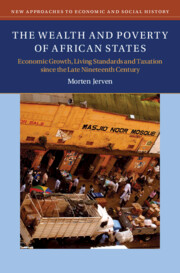 The Wealth and Poverty of African States
The Wealth and Poverty of African States Published online by Cambridge University Press: 06 January 2022
The statistical records that have been collected, systematized and synthesized here provide a quantitative basis to challenge and shape existing narratives on African economic development from the nineteenth-twentieth centuries. However, the history of counting and registering people is as old as documented history – with taxation, it is a central part of a state’s effort to govern. The word “statistics” itself derives from “state” and statistical records are primarily the historical footprint of states. We see what the states knew about themselves, what they cared to find out, and their chosen projected image. In this chapter, we give an overview of the history of census taking in Africa, and further evaluate the basis of the architecture of knowledge that colonial and postcolonial states have left behind. It is particularly important to clarify what kind of questions the state records can answer, and where other evidence sources will have to be used, as this chapter sets the ground for the empirical analysis presented in the three following chapters. The chapter concludes with a view toward further research, in particular the use of other data sources, to expand “new economic history” beyond the colonial period and the use of the colonial records.
To save this book to your Kindle, first ensure no-reply@cambridge.org is added to your Approved Personal Document E-mail List under your Personal Document Settings on the Manage Your Content and Devices page of your Amazon account. Then enter the ‘name’ part of your Kindle email address below. Find out more about saving to your Kindle.
Note you can select to save to either the @free.kindle.com or @kindle.com variations. ‘@free.kindle.com’ emails are free but can only be saved to your device when it is connected to wi-fi. ‘@kindle.com’ emails can be delivered even when you are not connected to wi-fi, but note that service fees apply.
Find out more about the Kindle Personal Document Service.
To save content items to your account, please confirm that you agree to abide by our usage policies. If this is the first time you use this feature, you will be asked to authorise Cambridge Core to connect with your account. Find out more about saving content to Dropbox.
To save content items to your account, please confirm that you agree to abide by our usage policies. If this is the first time you use this feature, you will be asked to authorise Cambridge Core to connect with your account. Find out more about saving content to Google Drive.